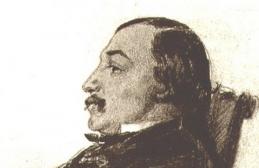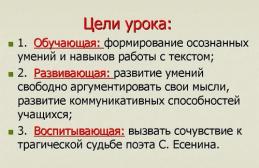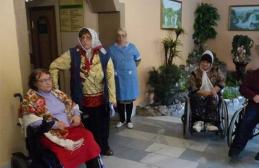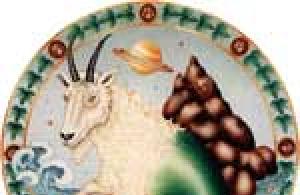Nikolai Alekseevich Nekrasov
No matter what year, your strength decreases,
The mind is lazier, the blood is colder...
Motherland! I'll reach the grave
Without waiting for your freedom!
But I wish I knew, dying,
That you are on the right path,
What is your plowman, sowing the fields,
Sees a great day ahead;
So that the wind of your native village
A single sound reached the ears,
Under which you can’t hear the boiling
Human blood and tears.

Nikolay Nekrasov
In 1861, Emperor Alexander II carried out one of the most important reforms in the history of the Russian Empire, abolishing serfdom. The corresponding manifesto was signed on February 19th. Many people did not like the transformations. Even to those who previously actively advocated for the complete eradication of slavery in Russia. According to radical contemporaries, the reform turned out to be half-hearted. It did not lead to the true liberation of the peasants. As a result, the situation of a significant number of ordinary village people not only did not improve, but also became significantly worse. Similar thoughts were close to Nekrasov. According to the memoirs of the writer and democratic revolutionary Nikolai Grigorievich Chernyshevsky, Nikolai Alekseevich reacted sharply negatively to the 1861 manifesto. He believed that the life of the peasants did not become easier, that they never managed to see real freedom, that one bondage was simply replaced by another. According to Nekrasov, the Russian Empire needed to follow the American path of development of capitalism. The poet advocated for the transfer of landowners' lands to the people, for the formation of individual peasant farms, and for the cultural development of ordinary people.
The poem “No matter the year, the strength decreases...” is dated 1861. Not least of all, it is devoted to reflections concerning the abolition of serfdom. In the first stanza the lyrical hero is pessimistic. He believes that during his lifetime he will not be destined to see the people of the Russian Empire free. The second and third quatrains are an expression of hope. The hero longs, at least on his deathbed, to see his native country on the right path. He cares about the happiness of ordinary people, ordinary workers. In the second stanza the image of a plowman appears. The hero wishes him clear days ahead. The finale is the most powerful and poignant part of the work. Here there is a transition from the particular to the general. The happiness of the native land is the happiness of its people. It is impossible as long as one can hear “the boiling of human blood and tears.”
The motive of death in the poem “No matter what the year, the strength decreases...” is closely related to reflections on the purpose of the poet and poetry. The lyrical hero is not just an artist, but also the owner of an active social position. She makes his path both righteous and painful. Similar views are found in Nekrasov’s other poems. In particular, we are talking about the works “In Memory of Dobrolyubov” and “On the Death of Shevchenko”.
“No matter what year, your strength decreases...” Nikolai Nekrasov
No matter what year, your strength decreases,
The mind is lazier, the blood is colder...
Motherland! I'll reach the grave
Without waiting for your freedom!But I wish I knew, dying,
That you are on the right path,
What is your plowman, sowing the fields,
Sees a great day ahead;So that the wind of your native village
A single sound reached the ears,
Under which you can’t hear the boiling
Human blood and tears.
Analysis of Nekrasov’s poem “No matter what year, the strength decreases...”
In 1861, Emperor Alexander II carried out one of the most important reforms in the history of the Russian Empire, abolishing serfdom. The corresponding manifesto was signed on February 19th. Many people did not like the transformations. Even to those who previously actively advocated for the complete eradication of slavery in Russia. According to radical contemporaries, the reform turned out to be half-hearted. It did not lead to the true liberation of the peasants. As a result, the situation of a significant number of ordinary village people not only did not improve, but also became significantly worse. Similar thoughts were close to Nekrasov. According to the memoirs of the writer and democratic revolutionary Nikolai Grigorievich Chernyshevsky, Nikolai Alekseevich reacted sharply negatively to the 1861 manifesto. He believed that the life of the peasants did not become easier, that they were never able to see real freedom, that one bondage was simply replaced by another. According to Nekrasov, the Russian Empire needed to follow the American path of development of capitalism. The poet advocated for the transfer of landowners' lands to the people, for the formation of individual peasant farms, and for the cultural development of ordinary people.
The poem “No matter the year, the strength decreases...” is dated 1861. Not least of all, it is devoted to reflections concerning the abolition of serfdom. In the first stanza, the lyrical hero is pessimistic. He believes that during his lifetime he will not be destined to see the people of the Russian Empire free. The second and third quatrains are an expression of hope. The hero longs, at least on his deathbed, to see his native country on the right path. He cares about the happiness of ordinary people, ordinary workers. In the second stanza the image of a plowman appears. The hero wishes him clear days ahead. The finale is the most powerful and poignant part of the work. Here there is a transition from the particular to the general. The happiness of the native land is the happiness of its people. It is impossible as long as one can hear “the boiling of human blood and tears.”
The motive of death in the poem “No matter what the year, the strength decreases...” is closely related to reflections on the purpose of the poet and poetry. The lyrical hero is not just an artist, but also the owner of an active social position. She makes his path both righteous and painful. Similar views are found in Nekrasov’s other poems. In particular, we are talking about the works "" and "".
No matter what year, your strength decreases,
The mind is lazier, the blood is colder...
Motherland! I'll reach the grave
Without waiting for your freedom!
But I wish I knew, dying,
That you are on the right path,
What is your plowman, sowing the fields,
Sees a great day ahead;
So that the wind of your native village
A single sound reached the ears,
Under which you can’t hear the boiling
Human blood and tears.
(No Ratings Yet)
More poems:
- The strength has disappeared... The dim light of the day... The cold of the grave Hugged me like a shroud... All the same walls, Dull heaviness in the mind, No change! It’s deaf and stuffy in prison. The cup is getting closer, Little...
- I feel both the strength and the desire to Serve others, fight and love; I bring inspiration to their altar, To encourage them with song in difficult times. But who will understand that they are not empty...
- The presence of an incomprehensible power is mysteriously hidden in everything: There is thought and life in the silence of the night, And in the brilliance of the day, and in the silence of the grave, In the movement of countless worlds, In the solemn peace of the ocean,...
- When the decrepit forces begin to betray us And we must, like old-timers, Give place to new arrivals, - Then save us, good genius, From cowardly reproaches, From slander, from bitterness For a changing life;...
- The bright mountains were drowning in fog, The sun was burning with its last fire... It was cold in the silent ocean, We sailed silently somewhere together. The wind rushed past, sick and homeless, and brought a song from the far shore. Quiet flame...
- I want my sons and their friends to carry my coffin on a wonderful funeral holiday. So that the pine boat floats on their shoulders slowly, but without delay. I will be proud and happy...
- 1. TRAIN It rattles with passengers and luggage, At the stops disturbing the bells. And on the way they remember the abandoned wives, the jealous guides. It rumbles... And midnight lay behind On the green-orange tail. Machinist with...
- In the young month of April, the snow melts in the old park, and the cheerful swings begin their run. Everything in the world has been forgotten! My heart sank in my chest! Only the sky, only the wind, Only joy ahead....
- The last flowers are miles away from the luxurious firstborn of the fields, they awaken sad dreams in us more vividly. So sometimes the hour of separation is more vivid than the date itself. A. S. Pushkin 1 When the bird cherry tree breathes the bashful bliss of spring,...
- There is no way back for me! I scream out of anguish! I run around the squares of the chessboard. I step through one: The others are not mine. Oh, my stingy joy, You and me are divided into two, - So that I...
- The path winds through the gorge, the mountain river rages, and, as the song says, your road is far. And ahead there is snow and ice lying on the passes, and ahead is the end of the road and the sea is shining...
- Slowly change, paintings, March, time, with a slow footstep, So that not a single day passes, Experiences, but is not noticed by me. The silence of peace and all the noises that fill the earth with life, the malice of the day and...
- I want silence, silence... Are my nerves burned or something? Silence... so that the shadow from the pine tree, tickling us, moves, cooling us like a prank, along the back, to the little toe of the foot, silence... The sounds seem to be turned off. What to call your...
- The days flashed brighter than gold, And the Night Bear ran. Catch up with her, prince, catch up with her, lasso her and tie her to the saddle! Lasso and tie it to the saddle, And then in the blue mansion Point to the Night Bear to Bogatyrsky...
- Once upon a time, near the walls of Tselinograd, early in the morning in the pouring rain, a radio brigade appeared to take part in the sowing campaign. The roads are long, the edges are virgin, Where different paths have brought us. No wine, no smoking,...









